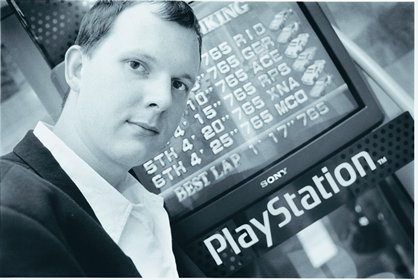Retro interview: Phil Harrison 13 years ago
We dig up Edge's post-PlayStation launch interview
Edge: Has the PlayStation seen a game yet that defines what the machine is about?
PH: Yes and no. Yes because the machine’s all about delivering a fantastic gameplay experience that is challenging and sophisticated, looks amazing and sounds great – there are many games that fit that description that I’ve already mentioned. But by its very nature that’s a moving target. There are so many talented people working on the machine now, doing things that we’ve not dreamed about and in ways that we’ve not seen before, that the definition of quality is almost impossible to define in terms of time. In the future we’ll look back at some of the launch games and snigger, whereas we hail them now as paradigm shifts in interactive entertainment – that’s what makes this business so exciting. The increase in the technology of game development yields a bigger and better result all the time.
Compare our business to the movie business – did awesome computer graphics make Jurassic Park a better story than King Kong? I suggest not. Some of the best movies ever made are now approaching 40 or 50 years old. While we may have a nostalgic fondness for the 8bit heroes of yesteryear, they don’t compare to the new games of today. Try comparing Tekken to Karate Champ on the Atari VCS or Ridge Racer to Pitstop on the C64.
Edge: What kind of software would you personally like to see on the console?
PH: Well, I enjoy the adrenaline rush of a fast 3D game but I crave for something more substantial, more cerebral – a game I can relate to on more than a reactive level. I want characters that I can relate to, argue with, be scared by, be attracted to and that have an appeal beyond the quality of the graphics. To use the movie analogy again, I think we can do the plots, the sets, the special effects and the camerawork incredibly well. We just need to work on the stories and the actors. This will add real emotional levels to gameplay that we’re only just beginning to experiment with as an industry.

Edge: If anything negative could be levelled at Sony so far, it’s that it still hasn’t proved it can develop a world-class videogame. What is SCE doing to rectify this problem?
PH: Firstly, I don’t think it’s strictly true. I would consider Wipeout and Destruction Derby world-class products and they were created by Sony Interactive Entertainment. Certainly, the review scores would back that statement up. If you mean why haven’t we created a Sonic or a Zelda yet, then I’d say Rome wasn’t built in a day. Sony has built a world-class hardware system and we are now investing many millions of dollars, pounds and yen to grow our software development resources to create games to match. This level of investment means that Sony is backing the system 100 per cent. Having said that, we do not seek to have a dominant position in the supply of software for the PlayStation. That would restrict the investment and creativity of our thirdparties, who are vital to our success – as a platform and as a business.
Weekly digests, tales from the communities you love, and more
Edge: It’s been said that future PlayStation development could yield less spectacular technical advances than we might see on the Saturn. Is this a realistic viewpoint?
PH: The thirdparties all say that PlayStation is easier to program than the Saturn because of our libraries and powerful operating system. We are constantly upgrading and improving the libraries we supply to developers so that game development is easier and quicker. This means programmers can harness more of the power of the machine – thus delivering greater value to the player. Sega do not take the same approach so I can’t comment on how their games might improve.
Edge: Do you think that CD-ROM has helped or hindered the videogame in the case of the PlayStation?
PH: It has helped at every single level. Technically it has allowed us to design a system around the benefits of CD – with CD digital audio, full-motion video and massive data storage for graphics and texture maps – something you can never do with a cartridge. From a creative software development standpoint, CD is the format of choice for the world’s leading developers. They enjoy the freedom it gives them in terms of design, and it inspires innovation. When a designer can call upon CD audio and video to augment an interactive experience, the possibilities are endless. Cartridge development is a process of overcoming technical and commercial hurdles that get ever more difficult to cross. From a business point of view, CD allows publishers to innovate and take risks with games. Cartridges take months to make, cost so much money and have so many restrictions that publishers can’t afford to experiment. They have to go for the proven gamestyles to make money – hence the fact that most Nintendo cartridge games looked the same and played the same. Thirdparties can’t take creative risks when so much money is at stake. The CD model is much more conducive to creative innovation, because they cost less, hold more information and take days to manufacture.



